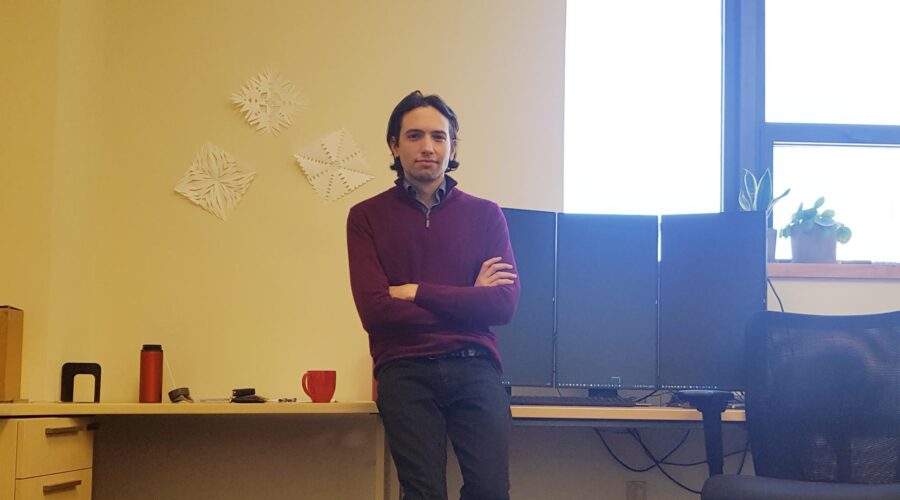IMDEA Networks

“En pocos años tendremos soluciones y aplicaciones que ahora ni siquiera podemos imaginar”
Entrevistamos a Augusto García-Agúndez, investigador PostDoc de IMDEA Networks
02 Junio 2022

Augusto García-Agúndez, investigador PostDoc en IMDEA Networks desde marzo de 2022, es un claro ejemplo de vocación científica. Graduado en Ingeniería Industrial en Automática y Electrónica (Universidad Politécnica de Madrid) y doctorado en Ciencias de la Computación por la Technische Universität Darmstadt, trabaja en la actualidad en el proyecto MAESTRO, una aportación de la investigación, con fondos de la Unión Europea, que puede salvar vidas gracias a la tecnología, en este caso, gracias a la aplicación de la Inteligencia Artificial y Analítica de Datos a la rehabilitación de personas afectadas por el ictus.
¿Cómo resumirías la esencia de tu actual trabajo como investigador, tanto en IMDEA Networks como en Brown University? ¿En qué momento decidiste adoptar tu actual desempeño, tus líneas de investigación, y por qué?
Intento encontrar aplicaciones de la ingeniería electrónica e informática a la Medicina. Mi familia ha tenido una gran influencia, mis padres son profesores de Medicina y han dedicado toda su carrera profesional a la investigación. Yo empecé a tener interés en la investigación mientras hacía mi TFM en Alemania, en 2014, sobre el uso de la cámara del smartphone para medir el pulso cardiaco (fotopletismografia). El resolver un problema entonces novedoso, implementarlo, dirigir un estudio con participantes y poder publicar los resultados en una revista científica fue lo que más me había interesado profesionalmente hasta entonces. Desde ese momento, me he dedicado a esto, y ahora mismo el mayor potencial está en la IA aplicada a la Medicina.
En el apartado personal, este trabajo supone una indudable aportación a la sociedad, pero también una responsabilidad para estar a la altura. En un entorno de tecnología de vanguardia, ¿cómo afrontas esta responsabilidad?
Hay que estar continuamente al día de qué están haciendo otros investigadores del mismo campo. La mejor forma de hacer esto es estudiar lo que se publica en el campo, organizar presentaciones internas en los laboratorios, participar en congresos, simposios, y ediciones especiales de revistas y revisiones. Siempre me han gustado tanto la Medicina como la tecnología, y cuando tuve que elegir carrera, aún no existía la posibilidad de estudiar Ingeniería Biomédica. En su momento, pensé que la Ingeniería Industrial era lo que más posibilidades ofrecía. Lo más importante que uno aprende en la ETSII UPM es a resolver problemas de ingeniería de un espectro lo más amplio posible, y a adaptarse rápidamente a áreas muy distintas. Durante toda mi carrera como investigador, estas habilidades, de amplio espectro y flexibilidad, han sido muy útiles.
¿Cómo prevés los horizontes de la biomedicina, desde tu ámbito de investigación, hasta dónde se podrá llegar?
El hecho de que la colaboración entre personal médico e ingenieros/as esté aumentando va a permitir avanzar en todos los ámbitos en los que la cantidad de información disponible es tan ingente y compleja que ya sólo se puede analizar con métodos de IA. El análisis de datos tiene un enorme potencial para evaluar el estado, el pronóstico y la adherencia al tratamiento de los/las pacientes, y permite grandes avances en los procedimientos diagnósticos y en los tratamientos. En este momento resulta difícil suponer dónde podrá estar el límite porque en pocos años tendremos soluciones y aplicaciones que ahora ni siquiera podemos imaginar.
Ya en el ámbito de una iniciativa de la talla de MAESTRO, ¿cómo destacas el presente y futuro próximo de tu implicación en el proyecto –por ejemplo, con la selección de pacientes en el Hospital de Rhode Island–? ¿Cuál es/será tu principal aportación?
Durante mi tesis doctoral, la implicación con los/las pacientes de estudios siempre fue muy cercana, ya que interactuábamos con ellos/as directamente y recogíamos los datos en persona. Por desgracia desde que empezó el COVID esto ya no es posible. La selección de pacientes correrá a cargo del neurólogo que colaborará con nosotros en Brown. Mi principal aportación será la implementación y desarrollo del software necesarios para el proyecto, para procesar y analizar la información, para obtener conclusiones de los estudios y plantear aplicaciones clínicas de los mismos.
¿Qué aspectos de tu tesis sobre gamificación y parkinson podrás aplicar en MAESTRO?
MAESTRO es una implementación mucho más desarrollada y compleja de la idea en la que se sustentaba mi tesis doctoral, y creo que se va a ver beneficiada con todo lo que pude (y no pude, pero quise) hacer durante la tesis. Y hay otros aspectos de interés, como las implicaciones éticas de la aplicación de la Inteligencia Artificial en la Medicina: del mismo modo que tiene potencial para resolver muchos problemas, también conlleva el riesgo de provocar muchos problemas si se usa de forma indebida. En este sentido, lo más importante es asegurar la veracidad y pluralidad de los datos en los que se fundamente cualquier desarrollo. Este es un asunto que me preocupa profundamente y que va a ser tenido en cuenta a lo largo de todo el estudio.
Esta investigación cuenta con el apoyo de la Marie Sklodowska Curie Individual Global Fellowship, ¿hasta qué punto es importante un reconocimiento de este tipo?
Las becas MSCA GF son un mecanismo de financiación excelente por muchos motivos. En primer lugar, asegurar financiación completa durante tres años supone una gran libertad y flexibilidad para llevar a cabo un proyecto como este. El que incluya un periodo en el extranjero es muy beneficioso para diversificar los conocimientos de los becados. Es lógico que sean tan competitivas y me considero muy afortunado de haberla conseguido. En mi opinión, se deberían poner en práctica planes de incorporación de los becados a los Centros de Investigación beneficiarios para obtener el máximo retorno de estos programas de formación postdoctoral europeo.
La investigación supone mucho tiempo, pero siempre lo debe haber para disfrutar de los hobbies, ¿cuáles son los tuyos?
Sin duda es importante disponer de tiempo libre, que aprovecho para leer (historia, medicina, psicología…), cocinar, nadar, y jugar a videojuegos.


Comentarios recientes